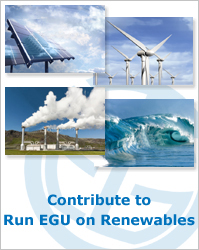EGU Running on Renewables
 Match the energy you will use in attending the EGU General Assembly. It takes €20 to generate from renewable sources the average amount of energy used by a delegate in travel and conference participation. The EGU asks you to pay this amount in addition to your conference registration fee. With your contribution the EGU will work to reduce greenhouse gas emissions, and to increase the capacity to harvest energy from renewable sources. By buying and operating its own installations, the EGU will strive to match its energy use in 15 years. It will have an increasing income from this activity, which will be used to support EGU outreach initiatives, and to help address strategic needs in energy use.
Match the energy you will use in attending the EGU General Assembly. It takes €20 to generate from renewable sources the average amount of energy used by a delegate in travel and conference participation. The EGU asks you to pay this amount in addition to your conference registration fee. With your contribution the EGU will work to reduce greenhouse gas emissions, and to increase the capacity to harvest energy from renewable sources. By buying and operating its own installations, the EGU will strive to match its energy use in 15 years. It will have an increasing income from this activity, which will be used to support EGU outreach initiatives, and to help address strategic needs in energy use.
Motivation
We all face the challenge to reduce emissions of greenhouse gasses from use of fossil fuels, and the imperative need to tap increasingly into alternative energy sources. The Earth Sciences community is a key player in the exploitation of fossil fuels, in the evaluation of its impact on climate and the environment, and in the mobilization of renewable energy resources. Therefore, the EGU is taking responsibility for its energy use and asks participants in its activities to do the same.
Mechanism
Recognizing the present inevitability of use of fossil fuels, for example in travel, the EGU will develop, with its members, the ability to offset all energy used in its activities with an equivalent amount of energy harvested from renewable sources such as wind, solar, wave, tide and geothermal.
The EGU will do this, not by paying into existing offsetting schemes, but instead by acquiring and running its own installations, optimizing their location, addressing strategic development needs, and securing the benefits for its community.
Each year, the EGU will acquire and install equipment capable of generating, over a period of 15 years, an amount of energy equivalent to the energy used in Union activities in that year. The energy, usually in the form of electricity, will be sold to specific users, or to the grid.
Costs
The EGU asks each member and participant in the General Assembly to make a financial contribution of €20 in support of this effort. Using standard figures*, this amount is justified as follows:
The average travel distance of a delegate to and from the General Assembly is about 1,500 km x 2. We assume that most delegates travel by air. Energy use in air travel is about 500 kWh per 1,000 km per person. Therefore a delegate would use about 1,500 kWh in travel. In addition, operation of the convention centre and EGU peripherals uses about 500 kWh per person. The total energy use per delegate is about 2,000 kWh. Installation and maintenance of hardware with 1kW capacity costs about €1,350. The cost of generating 2,000 kWh in 15 years is €20.
Through this flat fee delegates traveling shorter distances will help those coming from farther to carry the energy costs of their journey.
*From: Sustainable Energy - Without the Hot Air, MacKay, D. (2008).
Benefits
This initiative will allow the EGU to develop in about 15 years the independent ability to match all energy used in its activities in a given year with an equivalent amount of energy generated from renewable sources in that same year. Whilst this does not eliminate the emission of greenhouse gasses from our activities, it does reduce those emissions elsewhere by increasing the provision of energy from renewables.
Sales of energy will create a steadily growing income for the EGU. Revenues will be used to fund EGU outreach activities (50%), and to acquire further renewable energy installations and to help address strategic needs in energy use (50%).
For further information about the EGU Running on Renewables programme, please contact Niels Hovius, Chairman of the EGU Outreach Committee.






